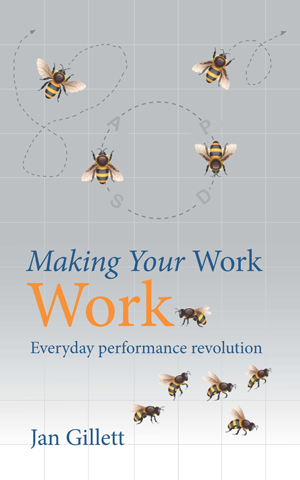How to deal with problems at work
28 March 2014 by Infinite Ideas in Business and finance
by Jan Gillett, author of Making your work work
Problems crop up every day, but are there universal principles in dealing with them? Chapter 7 of my book, Making your work work, addresses the subject of dealing with problems. The everyday performance revolution is to start with Study, working around the Plan, Do, Study, Act cycle, using problems as a trigger for permanent improvement of how your work works in future. We describe a simple flowchart to guide managers through the questions to be asked and the approach to be taken as a consequence.
S tudy. The first step is to go and see. Whether it’s a river flooding a town, or a part causing problems with customers, there is no substitute for visiting, watching, listening. What is the wider system, what is the system trying to accomplish, is this problem a surprise to those close to it? How does the reality compare with the paperwork, whether it’s the staffing levels, their training, communications, or the management structure, anything about the system that helps or hinders successful routine operations.
tudy. The first step is to go and see. Whether it’s a river flooding a town, or a part causing problems with customers, there is no substitute for visiting, watching, listening. What is the wider system, what is the system trying to accomplish, is this problem a surprise to those close to it? How does the reality compare with the paperwork, whether it’s the staffing levels, their training, communications, or the management structure, anything about the system that helps or hinders successful routine operations.
Study. Be visible and honest. If you don’t know, don’t fudge. You are learning, and hope to share that learning with those involved in order to improve. Build trust through under promising and over delivering, and be patient, it takes years to build trust, moments to lose it. But you can, and must, start now.
Study. Confirm if the problem is a surprise to those close to it. If it is a surprise a specific investigation should provide the information needed to avoid a repetition. If it’s not surprise then the whole process or system needs examination and redesign in order to minimise the chance of repetition. This will take time, but the effort will be rewarded. Shortcuts lead to repeat failures.
Don’t. Trust the numbers. Numbers are never reality, they are an abstraction of reality. They may not be an accurate abstraction, they may not be accurately collected, they are subject to wishful thinking and distortion. You may need to re-establish what data needs to be collected in order to guide future decisions.
Don’t. Look for culprits, threaten prosecution or blame. 95% of problems are the outcome of a complex series of interactions across the system, and these will only be discovered by cooperation across all the people involved. Threats close down that cooperation.
This is not complicated, but it is effective, a revolution available to every manager, every day.
